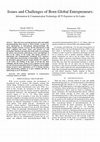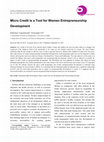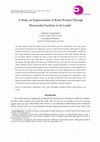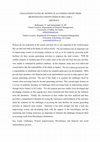Papers by Dr. D M Semasinghe - University of Kelaniya

5th Annual International Conference on Business Strategy and Asian Economic Transformation (BizStrategy 2015), 2015
There has been a growing interest in early and rapidly internationalizing firms, known as 'Born G... more There has been a growing interest in early and rapidly internationalizing firms, known as 'Born Globals', in place of a novel phenomenon in International Entrepreneurship (IE) domain. Despite extensive research, the BG phenomenon is still under explained and hence, theory and practice are still developing. Therefore, the main aim of this study is to investigate the nature, characteristics, performance, issues and challenges of BGs in the context of Sri Lanka with special reference to Information and Communication Technology (ICT) exporters, who exhibit those characteristics of born globals. The study uses the descriptive approach and the sample includes ICT exporters in Sri Lanka. The findings of the study reveal that the main challenges and the issues, facing by ICT exporters in Sri Lanka are; the structural composition of the ICT industry, lack of skillful human resources, heavy dependency on US & Europe markets, costly infrastructure facilities & its poor condition and lack of global image as an IT destination.

Rathiranee Yogendrarajah1, Semasinghe S.D2
1. Department of Financial Management, Univerisity of ... more Rathiranee Yogendrarajah1, Semasinghe S.D2
1. Department of Financial Management, Univerisity of Jaffna. 2. Department of Commerce & Financial Management, Univeristy of Kelaniya.
Received: May 28, 2015 / Accepted: June 25, 2015 / Published: September 25, 2015. Abstract: As a result of 30 years of an internal armed conflict, women and children not only lost male relatives in struggle, but comprised of the displaced. Most of the households in Sri Lanka are now headed exclusively by women. The micro finance institutions help the poor people in effective ways in order to generate income to enhance their standard of living in the rural areas. This study focuses on women entrepreneurship development through micro credit programme under post war development in Jaffna District selecting four rural areas which are Kopay, Chavakachcheri, Varani and Kodikamam. The main objective of this study is to identify the linkage with micro credit programmes and entrepreneurship development. Further it has an objective to identify the impact of micro credit on entrepreneurship development. The information has been gathered by primary data which has been distributed through the close ended questionnaire to the rural women in the above selected areas and seventy seven (77) responded out of 100. The relation between the micro credit programmes and women entrepreneurship development is examined using Statistical Package for Social Sciences (SPSS). It is concluded that the Entrepreneurship development has a significant relationship (p<0.05) with the microcredit programme and its impact on entrepreneurship development is crucial. It is suggested that the microcredit facilities are essential in women entrepreneurship development under post war development. Key words: Entrepreneurship Development, Micro credit, Post war development and Women Empowerment.

Rathiranee Yogendrarajah
University of Jaffna, Jaffna, Sri Lanka
Semasinghe Dissanayake
Universit... more Rathiranee Yogendrarajah
University of Jaffna, Jaffna, Sri Lanka
Semasinghe Dissanayake
University of Kelaniya, Kelaniya, Sri Lanka
This study seeks to examine the impact of micro credit facilities on women empowerment in the context of the
great importance being given to the entrepreneurs. Access to credit can help women by enabling them to start and
expand small businesses, often accompanied by market access. This study has the research problem—whether the
micro credit facilitates in empowering women entrepreneurs in the rural areas of Sri Lanka. Therefore, the study
has the primary objective to identify the impact of micro credit on empowerment and the sub to assess the
relationship among them. The study adopts a causal survey research design through which 337 members of
microfinance institutions (MFIs) in the study area of Northern Province in Sri Lanka were selected using stratified
random sampling and data collected from them by using a structured questionnaire. Correlation and regression
analysis has been used to find out the impact of micro credit facilities on empowerment of women entrepreneurs in
the rural areas of Sri Lanka. Linear multiple regression analysis was used to determine the micro credit facilities
that affect women empowerment by using SPSS. The model summary indicates that 10.9% of the variation in the
women empowerment can be explained for the micro credit facilities and remaining 89.1% influencing by other
factors, such as education, experience, income, etc. The study concluded that micro credit facilities alone do not
support the entrepreneurs to enhance them and it makes the policy recommendations to guide development of micro
credit facilities that are beneficial to the clients and other stakeholders of the MFI institutions.
Keywords: empowerment, entrepreneurs, micro credit, microfinance institutions (MFIs), small business, rural
women
The prime objective of this study is to identify the association between micro-credit and women e... more The prime objective of this study is to identify the association between micro-credit and women empowerment by giving opportunity for self-employment and the impact of micro-credit on women empowerment as well. This study focuses on women empowerment through micro-credit under post-war development in Jaffna District selecting five rural areas which are Chankanai, Sandilipay, Vaddukoddai, Uduvil, and Kondavil in Jaffna District.

Women are key instrument in the society and their role is very important in the world because the... more Women are key instrument in the society and their role is very important in the world because they act dual role both in the family as well as society. The microfinance has an important role in empowering women in developing countries as well as in Sri Lanka by accessing credit facilities for their income generating activities to empower the rural women. With the conflict situation in Northern part of Sri Lanka, most of the men left from that area and they were unable to withstand by political condition. In this situation, many men were killed and women had to take the responsibility of the family as leaders. The Sri Lankan government has a responsibility to rehabilitate and revitalize the situation under post war development. MFIs provide their members with financial and social intermediation services to help improve their income generating activities. The aim of this study is to examine the challenges faced by women when accessing loans for income generating activities. This concept paper focuses on a review of academic literature on Challenges when accessing loans in empowering women through micro finance in Sri Lanka. For this purpose previous studies from developed and developing countries on this regards have been examined and then found out the solutions from the literatures. Finally, the conclusion of their studies has been analyzed and then provided a comprehensive literature by seeing the experiences and usefulness of the activities about the solutions for the challenges in accessing the loan facilities for income generating activities to empower poor women. Therefore it has been strongly feel that a look into empowering women and developing them with the support of the microfinance and the monitoring and creating awareness are important to eliminate the challenges facing by them in accessing credit from Microfinance Institutions.

Empowering women entrepreneurs through Micro finance in Jaffna District, Sri Lanka: Challenges and Scenarios, Oct 1, 2014
Micro finance serves as a vital role for women entrepreneurship development in the developing cou... more Micro finance serves as a vital role for women entrepreneurship development in the developing countries as well as in Sri Lanka. As a result of 30 years conflict situation, women lost their male relatives in struggle, and forced to take a responsibility of their family in order to look after their children, aged parents and their male relatives. Micro finance institutions help the poor people particularly women in effective ways in order to create income generating activities. This study focuses the challenges and Scenarios associated with the adoption of microfinance as an instrument for empowering women entrepreneurs in Jaffna District in Sri Lanka. The prime objective of this study is to identify the challenges and scenarios in empowering women entrepreneurs through micro finance in Jaffna District. In this study the rural areas of Jaffna, Nallur, Kopay Divisional Secretariat Divisions, were selected as the sample size of population of women entrepreneurs who were involving in numerous self employable activities around 76 women. Both primary and secondary data were used for gathering information and quantitative and qualitative analysis was carried out to find out the results. To find out the results and check the validity and reliability of quantitative analysis the case study method also used in this study. In the quantitative analysis the correlation and regression method was used to find out the association between the variables of entrepreneurship challenges and needs and micro finance objectives by using SPSS. Three case study method also was included in this study that the women entrepreneurs were improved their activity by the support of micro finance institutions facing many challenges. The result of this study concluded that there is no significant relationship between the objectives of micro finance institutions and the needs of the respondents. In addition to this, using micro finance facilities create more job opportunities and variety of economic activities and improve household education, family welfare and empowering women themselves. Further this study shows that even though micro finance scheme is a strategy for increasing women entrepreneurs those who express their feelings on challenges and issues on marketing activities due to transport problem and financial difficulties. It is suggested that if much awareness will be created to enlighten the women entrepreneurs on record keeping, building assets, managing risk and increasing savings, it would be identified as the best strategy for helping poor women entrepreneurs' access on financial and non-financial services in MFIs.







Uploads
Papers by Dr. D M Semasinghe - University of Kelaniya
1. Department of Financial Management, Univerisity of Jaffna. 2. Department of Commerce & Financial Management, Univeristy of Kelaniya.
Received: May 28, 2015 / Accepted: June 25, 2015 / Published: September 25, 2015. Abstract: As a result of 30 years of an internal armed conflict, women and children not only lost male relatives in struggle, but comprised of the displaced. Most of the households in Sri Lanka are now headed exclusively by women. The micro finance institutions help the poor people in effective ways in order to generate income to enhance their standard of living in the rural areas. This study focuses on women entrepreneurship development through micro credit programme under post war development in Jaffna District selecting four rural areas which are Kopay, Chavakachcheri, Varani and Kodikamam. The main objective of this study is to identify the linkage with micro credit programmes and entrepreneurship development. Further it has an objective to identify the impact of micro credit on entrepreneurship development. The information has been gathered by primary data which has been distributed through the close ended questionnaire to the rural women in the above selected areas and seventy seven (77) responded out of 100. The relation between the micro credit programmes and women entrepreneurship development is examined using Statistical Package for Social Sciences (SPSS). It is concluded that the Entrepreneurship development has a significant relationship (p<0.05) with the microcredit programme and its impact on entrepreneurship development is crucial. It is suggested that the microcredit facilities are essential in women entrepreneurship development under post war development. Key words: Entrepreneurship Development, Micro credit, Post war development and Women Empowerment.
University of Jaffna, Jaffna, Sri Lanka
Semasinghe Dissanayake
University of Kelaniya, Kelaniya, Sri Lanka
This study seeks to examine the impact of micro credit facilities on women empowerment in the context of the
great importance being given to the entrepreneurs. Access to credit can help women by enabling them to start and
expand small businesses, often accompanied by market access. This study has the research problem—whether the
micro credit facilitates in empowering women entrepreneurs in the rural areas of Sri Lanka. Therefore, the study
has the primary objective to identify the impact of micro credit on empowerment and the sub to assess the
relationship among them. The study adopts a causal survey research design through which 337 members of
microfinance institutions (MFIs) in the study area of Northern Province in Sri Lanka were selected using stratified
random sampling and data collected from them by using a structured questionnaire. Correlation and regression
analysis has been used to find out the impact of micro credit facilities on empowerment of women entrepreneurs in
the rural areas of Sri Lanka. Linear multiple regression analysis was used to determine the micro credit facilities
that affect women empowerment by using SPSS. The model summary indicates that 10.9% of the variation in the
women empowerment can be explained for the micro credit facilities and remaining 89.1% influencing by other
factors, such as education, experience, income, etc. The study concluded that micro credit facilities alone do not
support the entrepreneurs to enhance them and it makes the policy recommendations to guide development of micro
credit facilities that are beneficial to the clients and other stakeholders of the MFI institutions.
Keywords: empowerment, entrepreneurs, micro credit, microfinance institutions (MFIs), small business, rural
women
1. Department of Financial Management, Univerisity of Jaffna. 2. Department of Commerce & Financial Management, Univeristy of Kelaniya.
Received: May 28, 2015 / Accepted: June 25, 2015 / Published: September 25, 2015. Abstract: As a result of 30 years of an internal armed conflict, women and children not only lost male relatives in struggle, but comprised of the displaced. Most of the households in Sri Lanka are now headed exclusively by women. The micro finance institutions help the poor people in effective ways in order to generate income to enhance their standard of living in the rural areas. This study focuses on women entrepreneurship development through micro credit programme under post war development in Jaffna District selecting four rural areas which are Kopay, Chavakachcheri, Varani and Kodikamam. The main objective of this study is to identify the linkage with micro credit programmes and entrepreneurship development. Further it has an objective to identify the impact of micro credit on entrepreneurship development. The information has been gathered by primary data which has been distributed through the close ended questionnaire to the rural women in the above selected areas and seventy seven (77) responded out of 100. The relation between the micro credit programmes and women entrepreneurship development is examined using Statistical Package for Social Sciences (SPSS). It is concluded that the Entrepreneurship development has a significant relationship (p<0.05) with the microcredit programme and its impact on entrepreneurship development is crucial. It is suggested that the microcredit facilities are essential in women entrepreneurship development under post war development. Key words: Entrepreneurship Development, Micro credit, Post war development and Women Empowerment.
University of Jaffna, Jaffna, Sri Lanka
Semasinghe Dissanayake
University of Kelaniya, Kelaniya, Sri Lanka
This study seeks to examine the impact of micro credit facilities on women empowerment in the context of the
great importance being given to the entrepreneurs. Access to credit can help women by enabling them to start and
expand small businesses, often accompanied by market access. This study has the research problem—whether the
micro credit facilitates in empowering women entrepreneurs in the rural areas of Sri Lanka. Therefore, the study
has the primary objective to identify the impact of micro credit on empowerment and the sub to assess the
relationship among them. The study adopts a causal survey research design through which 337 members of
microfinance institutions (MFIs) in the study area of Northern Province in Sri Lanka were selected using stratified
random sampling and data collected from them by using a structured questionnaire. Correlation and regression
analysis has been used to find out the impact of micro credit facilities on empowerment of women entrepreneurs in
the rural areas of Sri Lanka. Linear multiple regression analysis was used to determine the micro credit facilities
that affect women empowerment by using SPSS. The model summary indicates that 10.9% of the variation in the
women empowerment can be explained for the micro credit facilities and remaining 89.1% influencing by other
factors, such as education, experience, income, etc. The study concluded that micro credit facilities alone do not
support the entrepreneurs to enhance them and it makes the policy recommendations to guide development of micro
credit facilities that are beneficial to the clients and other stakeholders of the MFI institutions.
Keywords: empowerment, entrepreneurs, micro credit, microfinance institutions (MFIs), small business, rural
women